When it comes to coffee and blood pressure, timing is key. If you’re sensitive to caffeine, you might want to skip coffee, especially if your blood pressure is already high. Regular drinkers often develop a tolerance, but if you have severe hypertension, it’s wise to limit your intake. Stick to the FDA’s recommendation of up to 400 mg of caffeine daily, but monitor your blood pressure before and after coffee to gauge your response. Staying hydrated can also help mitigate negative effects. Curious about more tips on managing your coffee consumption effectively? There’s plenty more to explore. It’s also important to consider how coffee affects bloating, as some individuals may experience gastrointestinal discomfort after consumption. If you notice increased bloating after drinking coffee, it might be worth experimenting with different brewing methods or opting for low-acid coffee. Ultimately, finding the right balance that suits your body can lead to a more enjoyable coffee experience while keeping your blood pressure in check.
Key Takeaways
- Monitor blood pressure regularly, especially before and after caffeine consumption, to assess individual sensitivity.
- Drink coffee in moderation (up to 400 mg daily) to avoid temporary spikes in blood pressure.
- Skip coffee if you have severe hypertension or are pregnant; limit intake to under 200 mg daily.
- Stay hydrated by drinking water alongside coffee to mitigate potential negative effects on blood pressure.
- Establish a balanced diet to support overall cardiovascular health and reduce caffeine sensitivity.
Understanding Caffeine's Impact
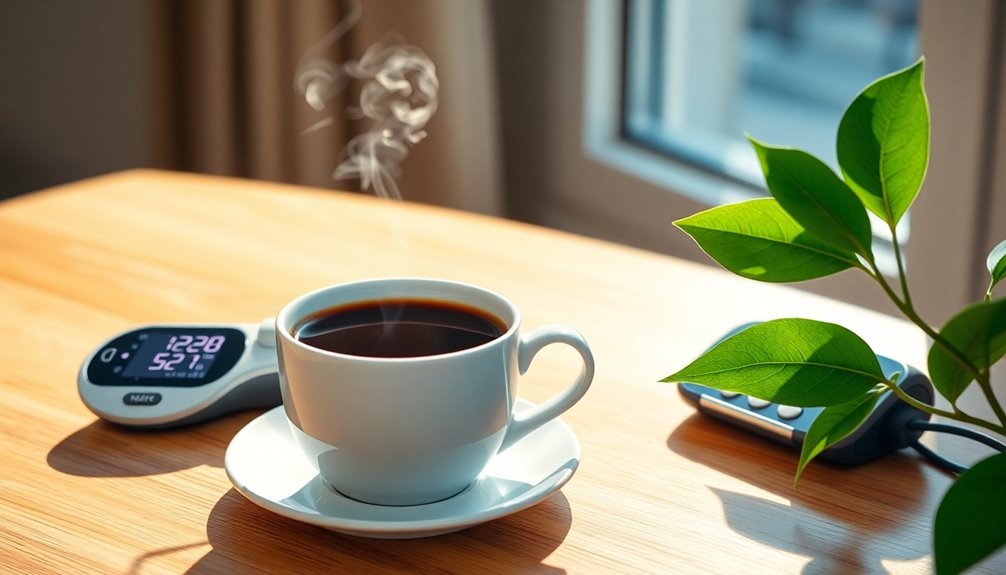
When you consume caffeine, you might notice a temporary spike in your blood pressure, especially if you're not a regular coffee drinker. This increase can range from 5-10 points, indicating your sensitivity to caffeine.
Regular coffee drinkers generally develop a tolerance, so their blood pressure remains stable with moderate coffee consumption of 1-3 cups per day.
However, if you have severe hypertension, it's essential to limit your coffee intake, as high consumption can worsen your condition and elevate cardiovascular risks.
The U.S. FDA considers up to 400 mg of caffeine daily safe for most adults without hypertension.
Individual Sensitivity to Caffeine
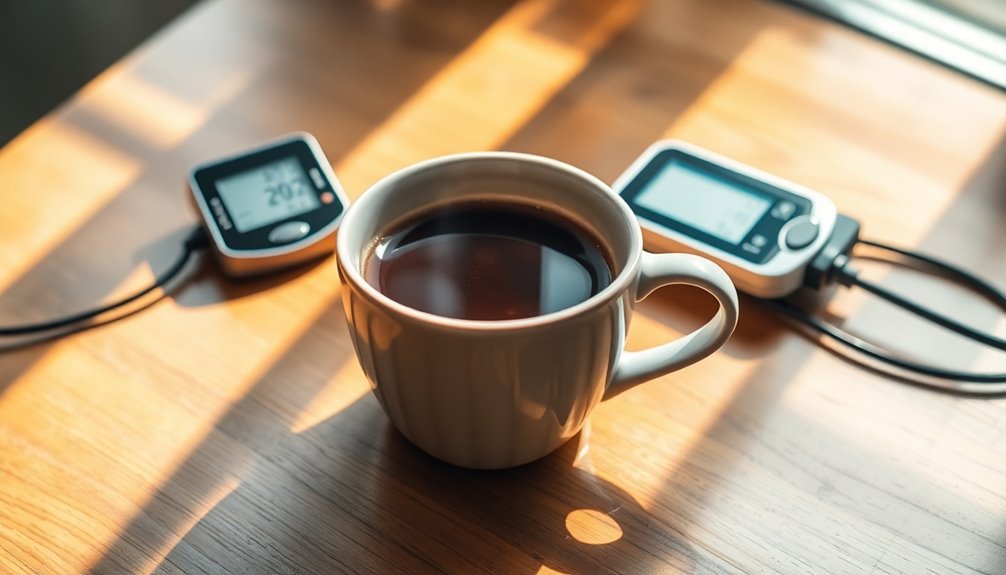
Individual sensitivity to caffeine varies widely, affecting how your blood pressure reacts after consumption. Some may experience temporary spikes, while others see minimal effects. Genetic factors influence caffeine metabolism, resulting in different side effects, like anxiety or palpitations. Regular caffeine consumers often develop tolerance, which means their blood pressure may not rise as considerably compared to infrequent users.
| Sensitivity Level | Effects on Blood Pressure | Recommendations |
|---|---|---|
| Low | Minimal increase | Moderate intake |
| Moderate | 5-10 point increase | Monitor closely |
| High | Considerable spikes | Limit or avoid caffeine |
| Pre-existing conditions | Varies | Consult a doctor |
Monitoring blood pressure before and after caffeine can help you understand your sensitivity, especially if you have pre-existing conditions like hypertension.
Safe Coffee Consumption Guidelines
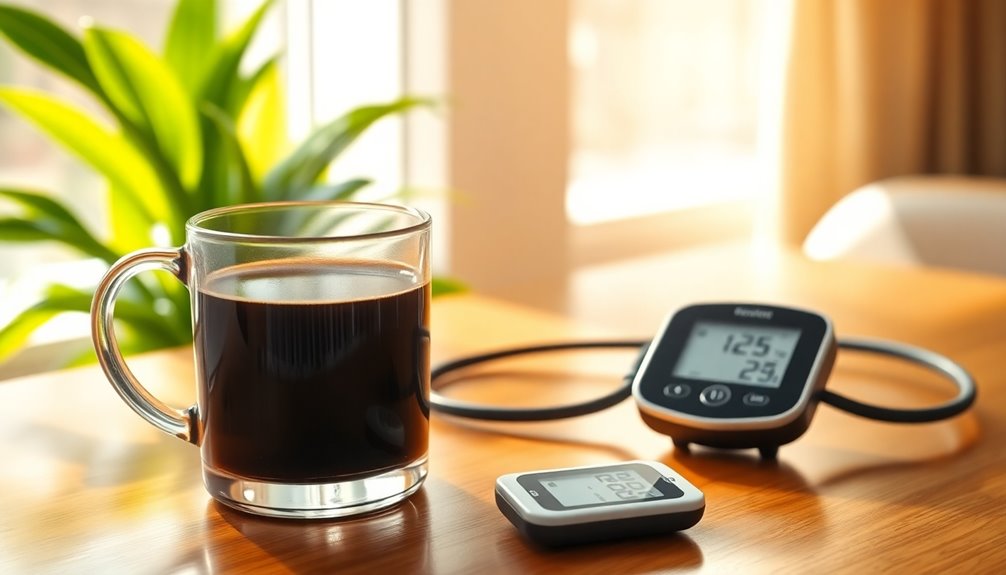
While enjoying your daily cup of coffee, it's essential to be mindful of safe consumption guidelines to maintain healthy blood pressure levels.
For most healthy adults, the U.S. FDA recommends a maximum caffeine intake of 400 mg per day, roughly 4-5 cups of coffee. However, if you have severe hypertension, limit your coffee consumption to reduce the risk of increased blood pressure.
Regular coffee drinkers often develop a tolerance to caffeine, making moderate consumption less likely to cause significant spikes.
Pregnant individuals should restrict intake to under 200 mg daily, about 1-2 small cups.
For those sensitive to caffeine, monitoring your blood pressure before and after coffee consumption is wise, as a 5-10 point increase could signal a reaction.
Health Risks of Excessive Caffeine
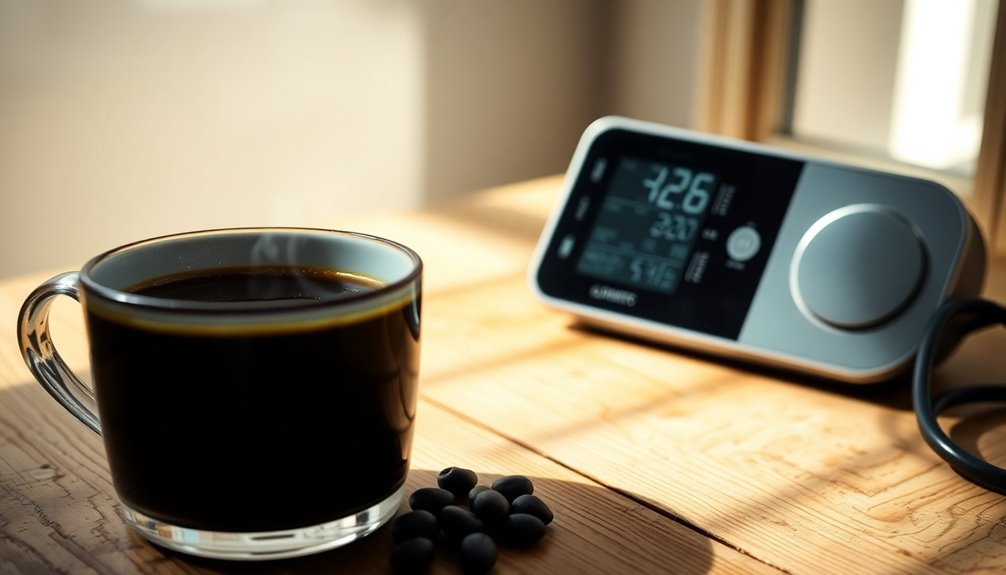
Excessive caffeine consumption can lead to a range of health risks that you shouldn't ignore. If you're drinking more than 400 mg per day, you might face increased heart rate, anxiety, and even insomnia. Temporary spikes in blood pressure can occur, heightening the risk of hypertension over time. This is particularly concerning for those with high blood pressure, as it increases cardiovascular risks like heart attack and stroke. Remember, caffeine sensitivity varies; some may experience adverse effects with lower amounts. Additionally, individuals with certain health conditions should be particularly cautious about their caffeine intake.
| Health Risks | Effects on Blood Pressure | Recommendations |
|---|---|---|
| Increased Heart Rate | Temporary spikes | Limit to 400 mg/day |
| Anxiety | Potential hypertension | Monitor your intake |
| Digestive Issues | Long-term effects | Personalize caffeine limits |
Coffee and Heart Health Benefits
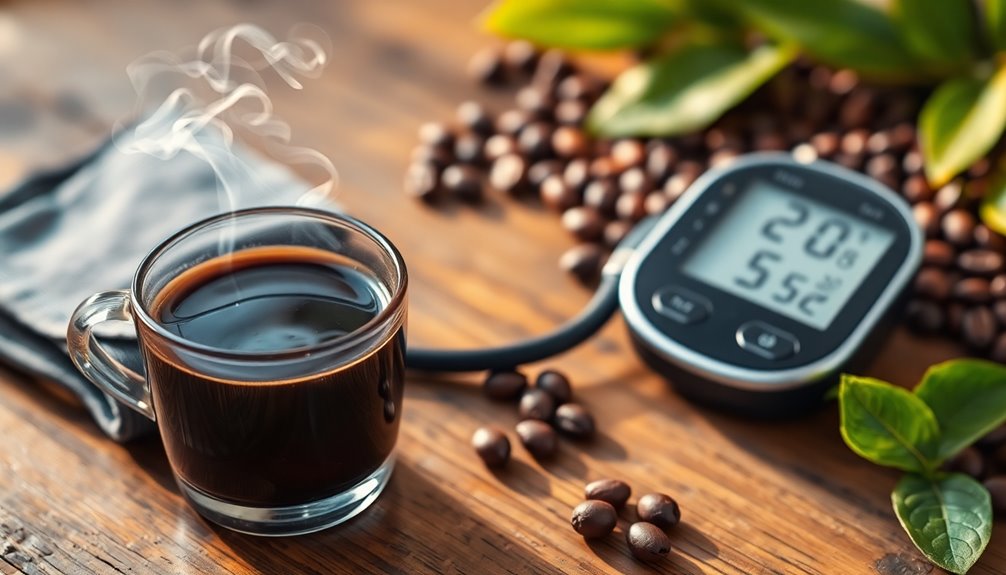
Moderate coffee consumption can actually offer some surprising heart health benefits. When you enjoy 1-3 cups a day, you might experience: Other potential heart health benefits of moderate coffee consumption include a reduced risk of stroke and lower levels of inflammation in the body. However, it’s important to note that excessive coffee consumption can have negative effects on heart health, such as increased heart rate and blood pressure. Additionally, for individuals with gastroesophageal reflux disease (GERD), known as coffee and gerd, coffee can exacerbate symptoms and should be consumed in moderation.
- Decreased Risk of Heart Failure: Regular coffee drinkers show lower chances of heart failure and cardiovascular mortality.
- Antioxidant Boost: Coffee is rich in antioxidants, which support cardiovascular health.
- Improved Mood and Cognition: Studies suggest that coffee can enhance mood and cognitive function, benefiting overall heart health.
- Hypertension Research: Ongoing studies indicate that moderate coffee consumption doesn't necessarily increase blood pressure.
Additionally, coffee contains antioxidants that combat oxidative stress, further contributing to its heart health benefits.
The U.S. Food and Drug Administration recommends keeping caffeine intake under 400 mg daily to avoid adverse effects.
Monitoring Blood Pressure Effectively
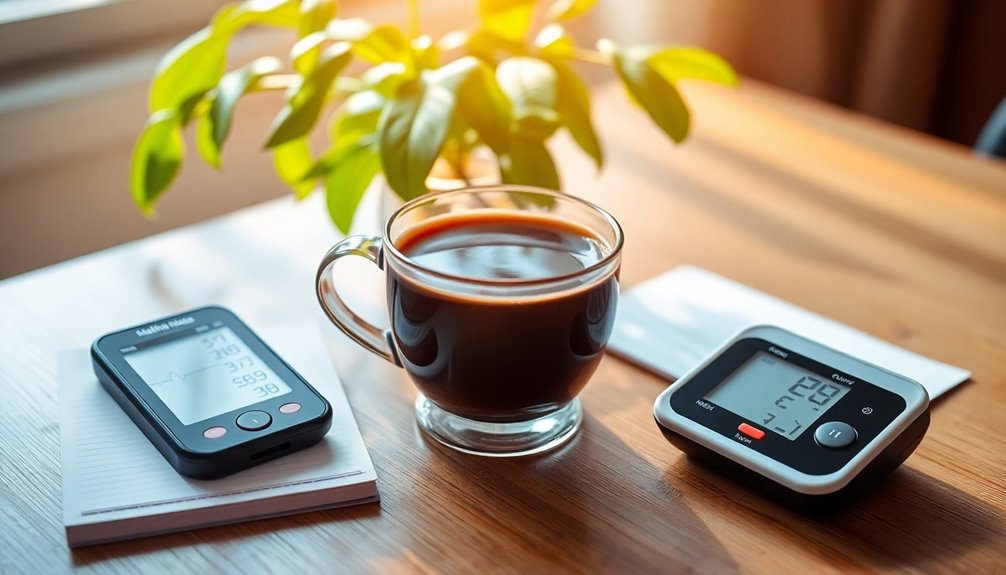
Effective blood pressure monitoring is essential for understanding how your body reacts to various factors, including coffee consumption. Regularly measure your blood pressure before and after caffeine consumption to identify individual sensitivity.
A 5-10 point increase in blood pressure post-coffee indicates a potential sensitivity to caffeine. Self-reporting your coffee intake alongside these measurements can reveal insights into your unique response.
Remember, the U.S. FDA recommends a daily caffeine intake of 400 mg for most adults, but if you have high blood pressure, you should monitor your reaction closely. Additionally, consider the effects of stress and diet during your monitoring.
Use home blood pressure monitoring devices consistently, ensuring they're calibrated for accuracy to get reliable readings.
When to Consult a Healthcare Provider
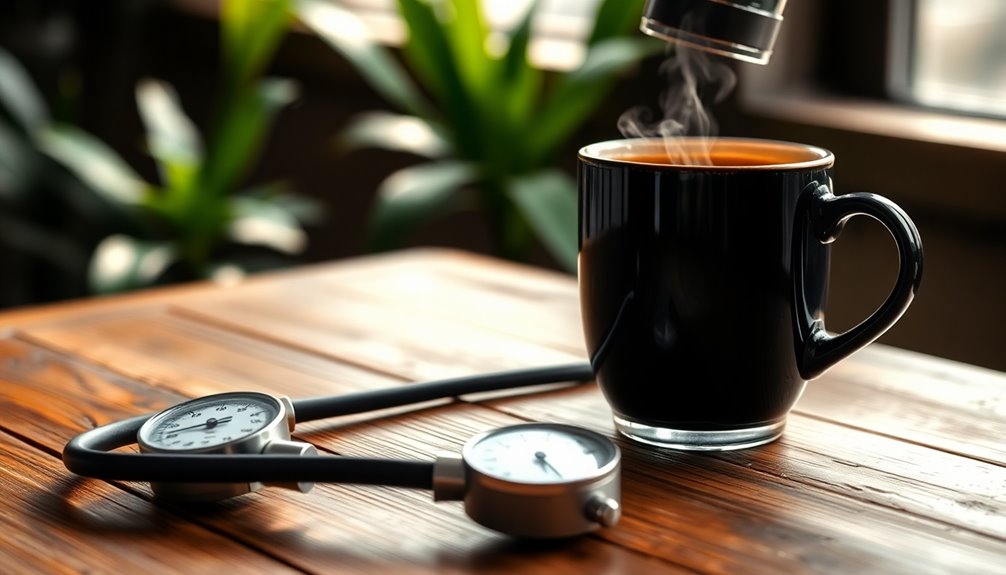
If you're monitoring your blood pressure and notice significant changes, it's time to consult a healthcare provider.
Understanding your caffeine sensitivity and how it interacts with any medications you take is essential for your health.
Don't hesitate to seek personalized guidance to guarantee your coffee habits fit your overall well-being.
Blood Pressure Monitoring Importance
Monitoring your blood pressure is essential, especially for those who consume caffeine, as it helps identify any sensitivity or spikes that may occur after drinking coffee.
If you have hypertension or experience notable fluctuations, consider the following:
- Consult a healthcare provider about your caffeine consumption and its effects on your blood pressure.
- Monitor your blood pressure regularly to detect any significant increases after caffeine intake.
- Recognize symptoms such as palpitations or anxiety that may indicate sensitivity.
- Discuss dietary adjustments with your provider if you notice changes of 5-10 points in your blood pressure after drinking coffee.
The U.S. FDA advises that adults without hypertension can consume up to 400 mg of caffeine daily, but personal tolerance varies. Additionally, individuals should be aware of the potential risks associated with exotic weed appeal, as these substances can also impact cardiovascular health.
Caffeine Sensitivity Evaluation
Understanding your sensitivity to caffeine is essential, especially if you notice fluctuations in your blood pressure after consumption.
If you experience significant spikes of 5-10 points, it's vital to monitor your intake and consult a healthcare provider for personalized advice. This is especially important if you have existing health conditions like severe hypertension or arrhythmias, as caffeine consumption might exacerbate these issues.
Additionally, if you're taking medications that interact with caffeine, seek medical guidance to avoid adverse effects. Genetic factors also play a role in caffeine sensitivity, so consider an evaluation if you're unsure.
If you face withdrawal symptoms when cutting back, your healthcare provider can help create a gradual reduction plan to minimize discomfort. Moreover, developing healthy eating habits from an early age can influence overall health, including caffeine sensitivity.
Medication Interaction Assessment
When considering caffeine consumption, it's crucial to consult your healthcare provider, especially if you're taking medications for hypertension or other chronic conditions.
Caffeine can interact with various medications, potentially leading to adverse effects. Here are key points to discuss:
- The impact of caffeine on your blood pressure and medication interactions.
- Safe caffeine limits, particularly if you're pregnant or have heart disease.
- Regular monitoring of your blood pressure while consuming caffeine.
- Personalized advice tailored to your specific health needs. Additionally, understanding the concept of hydration and nutrition can help mitigate some of the risks associated with caffeine intake.
Frequently Asked Questions
How Long Does Coffee Keep Your Blood Pressure Elevated?
Coffee can keep your blood pressure elevated for about 3-4 hours after you drink it, with the peak effect occurring within 30 to 120 minutes.
If you're a regular coffee drinker, you might notice less of a spike due to developing a tolerance.
However, if you're sensitive to caffeine or have hypertension, it's best to monitor your blood pressure closely to understand how it affects you personally.
What Should Be BP Before and After Coffee?
Before you drink coffee, your blood pressure should ideally be within your normal range, typically around 120/80 mmHg.
After consuming coffee, you might see a temporary increase of 5-10 points, especially if you're sensitive to caffeine or don't drink it regularly.
If your blood pressure spikes considerably or stays elevated, it's wise to monitor your intake and consult a healthcare professional to guarantee you're managing your health effectively.
Should I Drink Coffee if My BP Is Low?
If you're feeling like you're running on empty, a cup of coffee might just be your ticket to a little pick-me-up.
When your blood pressure's low, the caffeine can give it a temporary boost. However, keep an eye on how your body reacts—monitor your BP before and after.
Too much coffee can lead to jitters and other issues, so it's best to find a balance and consult your healthcare provider for personalized advice.
How Much Will Blood Pressure Drop After Quitting Coffee?
When you quit coffee, you might notice your blood pressure drops by about 3-4 mmHg, but it can vary.
Some people experience a more significant decrease, especially if they'd high blood pressure before stopping.
While withdrawal symptoms like headaches can occur, they usually clear up in a week.
It's a good idea to monitor your blood pressure after quitting, as you could see improvements in your overall cardiovascular health over time.
Conclusion
In the delightful dance of caffeine and blood pressure, it's all about balance. Enjoying your coffee can be a charming ritual, but keep an eye on how it affects you personally. If you're feeling a bit jittery or notice any unusual spikes, it might be time to reconsider that extra cup. Remember, your heart deserves the best, so don't hesitate to chat with your healthcare provider if you're ever in doubt. Cheers to your health!









